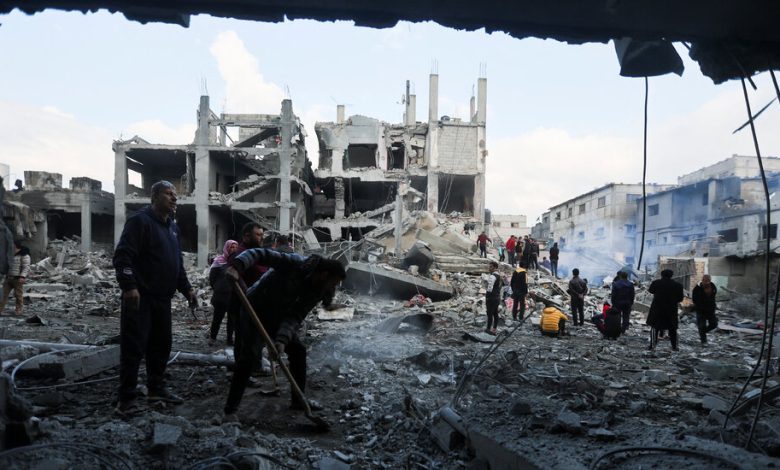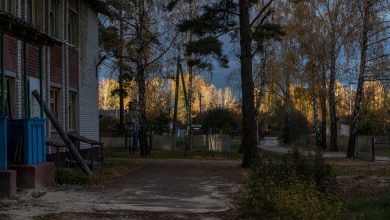Israel Tells Gazans to Evacuate More Territory, as Offensive Grinds On

The Israeli military on Friday instructed residents in the central Gaza Strip to move farther south immediately, as its troops continued their slow advance through the enclave and expectations of an imminent victory over Hamas appeared dim.
The call to evacuate in Al Bureij — an area in central Gaza where Israel has not previously focused its offensive — comes as the military has been operating in the northern Gaza Strip and engaging in intense fighting in recent weeks in and around the southern city of Khan Younis.
“Our forces continue to intensify ground operations in northern and southern Gaza,” Rear Adm. Daniel Hagari, the chief spokesman for the Israeli military, said on Thursday night.
Israel says it has achieved operational control in some areas in the north, but the grinding progress is leading some prominent Israeli military analysts and political commentators to point to a widening gap between the reality on the ground and the rhetoric of Prime Minister Benjamin Netanyahu, who pledged on Wednesday that the war “will continue until Hamas is eliminated — until victory.”
As the Gazan death toll has soared and civilians have been pushed into a small southern corner of the enclave, Israel has come under increasing pressure from the United States and other countries to scale back its operations and move to a less intensive phase of fighting in the coming weeks.
The military’s goal is to bring down Hamas’s rule in Gaza, destroy or degrade its military capabilities to the point that it no longer poses a threat to Israel and to bring back about 120 hostages who remain in Gaza.
But Hamas’s top leaders so far have evaded capture, and Gaza’s armed groups have continued to fire rockets into Israel, including two barrages that reached Tel Aviv and its environs this week.
Izzat al-Rishq, a member of Hamas’s political bureau, dismissed Mr. Netanyahu’s declarations about eliminating Hamas as “foolish” and “absurd propaganda.”
“Netanyahu raises the slogan of victory and the elimination of Hamas,” Mr. Rishq said in a statement on Friday. He added: “It is an illusion and a mirage that will not be achieved, and it will crash due to the steadfastness of our people.”
Political commentators and some military experts have been lowering expectations for a quick and decisive victory.
“Nobody should imagine that there will be a situation where we put a flag on top of a hill and say ‘OK, we won, and now Gaza will be peaceful and safe,’ It will not happen,” said Gabi Siboni, a colonel in the reserves and a fellow at the conservative-leaning Jerusalem Institute for Strategy and Security. “The reality is that we are going to be fighting in Gaza for years to come.”
Others echoed that assessment. “There will be no ‘victory picture,’” wrote Ben Caspit, a political columnist and a longtime critic of Mr. Netanyahu, in Friday’s Maariv newspaper. He added: “The realization that ‘eliminating’ Hamas is an unrealistic short-term objective is creeping in.”
Israel’s defense minister, Yoav Gallant, emphasized on Friday that Israel’s campaign would be a long one that “requires patience.” In northern Gaza, he said in a video statement, the military was “gradually achieving the objectives we set, first among them dismantling Hamas’s battalions and stripping Hamas of its underground capabilities.”
Israel has used thousands of airstrikes, heavy bombs and artillery as it tries to dismantle Hamas and its infrastructure, and the Gaza Health Ministry said on Thursday that the death toll in Gaza was more than 20,000.
During the first six weeks of the war, it regularly used 2,000-pound bombs — some of its biggest and most destructive — in areas it designated safe for civilians, according to an analysis of visual evidence by The New York Times. While bombs of that size are used by several Western militaries, munitions experts say they are almost never dropped by U.S. forces in densely populated areas anymore.
Gazans who have left their homes and moved south say they do not feel safe there and that no areas are off-limits for Israeli bombing. Israel called on Friday for people to leave Al Bureij for shelters in Deir al-Balah, which lies a short distance further south in central Gaza.
“It is not safe here either,” said Nevin Muhaisen, 35, a teacher from northern Gaza who moved to Deir al-Balah early in the war and shares an apartment with about 30 members of her extended family, by WhatsApp message. “I keep hearing explosions at the coastal part of the city and in Khan Younis,” she added.
Abu Bakr Bashir contributed reporting.





